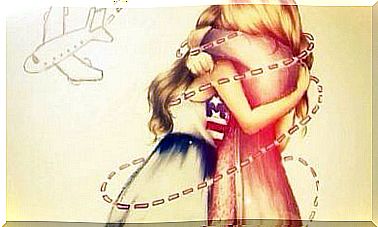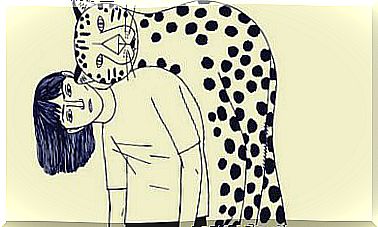The 5 Phases Of Kübler-Ross Mourning

Among the studies concerning the confrontation of death, one of the best known is probably that concerning the 5 phases of Kübler-Ross mourning. This theory tells us about the 5 phases that people go through when facing death, whether it is their own or that of a loved one. The Kübler-Ross studies have become very popular and misinterpreted, surely because of poor disclosure.
In 1969, psychologist Kübler-Ross carried out a series of studies on terminally ill patients. His intention was to find the factors behind the confrontation of death. After arduous investigation, she realized that these patients were going through a series of very similar stages. It was from there that she began to develop the theory of the stages of grief and their implications.
In this article, we will try to explain this Kübler-Ross theory of the stages of mourning as well as possible . First, we will outline the different phases and explain them one by one. Then, we will do a little reflection on the evidence and implications of the theory of stages of mourning.

Kübler-Ross stages of mourning
The different phases of mourning will show us the succession of attitudes adopted by a person facing death. The appearance of these stages arises from the mind’s attempts to solve the problem, and depending on the evolution of the incapacity of these stages, the emotions vary until they reach acceptance. We will now explain to you one by one the different phases of Kübler-Ross mourning:
- Negation. It involves an attitude of denying or ignoring the existence of the proximity of death. It can be total (“I can’t be dying”) or partial (“I have metastasized but it’s not very important”). The negation reflects a defensive attitude of the ego. Our mind is looking for a way to maintain our well-being when it finds itself in a situation of extreme powerlessness.
- Anger. Anger is an emotion that arises when facing an obstacle. It is normal that after a very negative news, the body seeks to resolve it through anger. This can have different victims or different objectives: the person himself, the doctors or even a “divine figure”.
- Negotiation. After observing the incapacity of anger when solving the problem, negotiation arises. The desperate person asks fate or divine figures for death to disappear. It is frequent that the person becomes “docile” in the face of the hope of seeing his life prolonged in exchange for good behavior; for example, by following all medical prescriptions to the letter.
- Depression. When the disease worsens or when fateful reality sets in, depression takes over. The person falls into extreme despair due to a strong sense of helplessness. The deep sadness is responsible for minimizing the use of resources in the face of an irrevocable situation.
- Acceptance. Once the feeling of helplessness caused by the loss is assimilated and left behind, we move to a less intense, more neutral feeling (although there are still difficult times). The person in the acceptance phase will be able to assimilate what happened and look up to the future, in addition to reinterpreting the meaning of the loss in a positive way, without blaming it on someone. a.

Evidence and implications of the theory
The Kübler-Ross theory has suffered from much criticism. Frequent and understandable criticism given the original formulation of the theory is linked to the rigidity of the latter. In the original formulation, a person who will go through the different phases can only stay in the one they are in or advance to the next one. Current research, and perhaps even your personal experience, tells us this is not true. There are points at which it is common for setbacks to occur or even people who skip a step or go through them all in a separate order.
However, it is true that they all play an important role when it comes to dealing with death and that their disposition adapts quite well during most bereavements. On the other hand, it would perhaps be more correct to interpret the different states as attitudes towards loss and not as stages in the face of the latter. That is, ways to deal with the helplessness caused by the situation.
Even if the Kübler-Ross theory is partially incomplete, its formulation undoubtedly assumed a great advance in the understanding of grieving processes. His research has served to deeply understand the emotions present in the face of loss. Which has led to better treatment and adjustment to people who find themselves in this situation, starting with the normalization of how they feel. In addition, his model has also allowed psychologists to be much more skillful when dealing with anticipated losses or terminal diagnoses.










